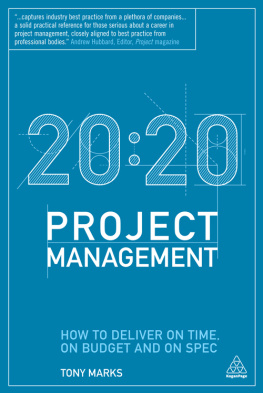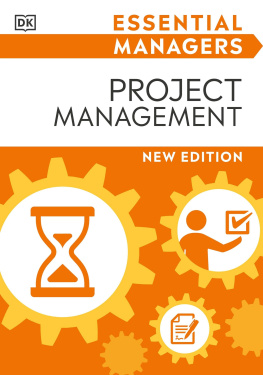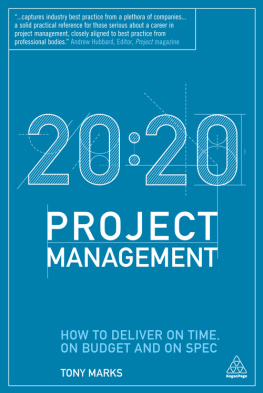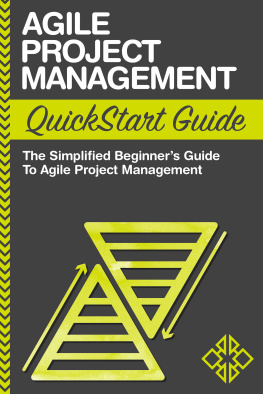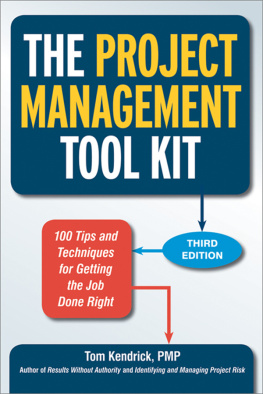Project Management for Non-Project Managers
Project Management for Non-Project Managers
JACK FERRARO, PMP

Bulk discounts available. For details visit:
www.amacombooks.org/go/specialsales
Or contact special sales:
Phone: 800-250-5308
E-mail: specialsls@amanet.org
View all the AMACOM titles at: www.amacombooks.org
PMI and the PMI logo are service and trademarks of the Project Management Institute, Inc. which are registered in the United States of America and other nations; PMP and the PMP logo are certification marks of the Project Management Institute, Inc. which are registered in the United States of America and other nations; PMBOK, PM Network, and PMI Today are trademarks of the Project Management Institute, Inc. which are registered in the United States of America and other nations;... building professionalism in project management is a trade and service mark of the Project Management Institute, Inc. which is registered in the United States of America and other nations; and the Project Management Journal logo is a trademark of the Project Management Institute, Inc.
PMI did not participate in the development of this publication and has not reviewed the content for accuracy. PMI does not endorse or otherwise sponsor this publication and makes no warranty, guarantee, or representation, expressed or implied, as to its accuracy or content. PMI does not have any financial interest in this publication, and has not contributed any financial resources.
Additionally, PMI makes no warranty, guarantee, or representation, express or implied, that the successful completion of any activity or program, or the use of any product or publication, designed to prepare candidates for the PMP Certification Examination, will result in the completion or satisfaction of any PMP Certification eligibility requirement or standard.
This publication is designed to provide accurate and authoritative information in regard to the subject matter covered. It is sold with the understanding that the publisher is not engaged in rendering legal, accounting, or other professional service. If legal advice or other expert assistance is required, the services of a competent professional person should be sought.
Library of Congress Cataloging-in-Publication Data
Ferraro, Jack
Project management for non-project managers / Jack Ferraro.1st ed.
p. cm.
Includes bibliographical references and index.
ISBN-13: 978-0-8144-1736-2
ISBN-10: 0-8144-1736-1
1. Project management. 2. Strategic planning. 3. Organizational effectiveness. I. Title. HD69.P75F467 2012
658.404dc23
2011040479
2012 Jack Ferraro.
All rights reserved.
Printed in the United States of America.
This publication may not be reproduced, stored in a retrieval system, or transmitted in whole or in part, in any form or by any means, electronic, mechanical, photocopying, recording, or otherwise, without the prior written permission of AMACOM, a division of American Management Association, 1601 Broadway, New York, NY 10019.
About AMA
American Management Association ( www.amanet.org ) is a world leader in talent development, advancing the skills of individuals to drive business success. Our mission is to support the goals of individuals and organizations through a complete range of products and services, including classroom and virtual seminars, webcasts, webinars, podcasts, conferences, corporate and government solutions, business books, and research. AMAs approach to improving performance combines experiential learninglearning through doingwith opportunities for ongoing professional growth at every step of ones career journey.
Printing number
10 9 8 7 6 5 4 3 2 1
Contents
PART ONE:
The Critical Role of the Functional Manager in Project Success
PART TWO:
Four Critical Project Management Skills for Functional Managers
Acknowledgments
Writing a book is project. And just as in any project, you need to rely on people to do great work with dedication, attention to detail, and a passion for what you are attempting to achieve. I have been blessed to have the assistance of such people.
First, I would like to thank my professional editor, Katy OGrady. Her shared vision and commitment to this book was unending. For this, my second book, I was very fortunate to have Katy edit the manuscript and add clarity and impact to the messages I am communicating.
I also would like to thank my good friend and golfing pal Dave Prokop and his wife, Martha, who kindly opened their beautiful beach house in North Carolina to me for a few weeks, where the bulk of the manuscript was written. Being in a comfortable, beautiful environment that provides ample solitude is the best way to write effectively. Remember, Dave, everything breaks to the ocean when putting in the living room.
I would like to thank all my customers and project team members from whom I have learned so much over the years, on good projects and bad projects.
Lastly, I would like to thank my wife, Sonia, and son, Jonathan, for bearing with me as I worked on this project.
Introduction
The most common vehicle for implementing change within an organization is the project, or a combination of projects known as a program. Projects are becoming more strategic in nature and scope, and an increasing number of traditional white-collar workers are involved with projects in some fashion. These projects often require unprecedented collaboration within an organizations lines of business, and across the business enterprise. This dynamic is creating a need for functional managers to work in collaboration, communicate effectively, and appreciate the best practice methods of project teams.
Project executives, sponsors, middle managers, and functional managers are expected to be involved in an organizations projectsover and above their duties of managing budgets, operations, and personnel. Functional managers job responsibilities, if not formally written, often implicitly include the implementation of positive change, delivered through projects. However, little attention is focused on the importance of functional managers understanding of how projects should work. Despite this, functional managers are the bridge to successful organizational change.
Unfortunately, project managers and their teams have embraced their own project management idiom. They communicate successfully among themselves using their own dialect and project management jargon. These project teams are often trained in organizational project management methodology and industry standards (e.g., they have read A Guide to the Project Management Body of Knowledge, the PMBOK Guide), and their jargon can isolate a functional manager from his or her project team. This can lead to a lack of understanding of fundamental project processes on the part of functional manager and can result in poor communication, unhealthy conflict, project rework, schedule delays, cost overruns, and lost business opportunities.
While project management has grown rapidly as a career and core competency, with organizations embracing industry certifications such as the Project Management Professional (PMP), project management methodology and processes have done little to improve the working relationships between project teams (providers) and business units (customers).
Next page

